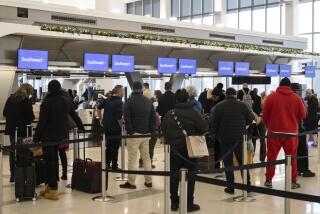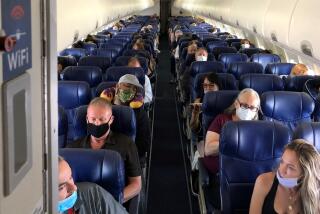AIR TRAVEL : U.S. May Forbid Some Electronic Devices on Flights to Aid Security
- Share via
WASHINGTON — The Bush Administration says it might prohibit airline passengers from taking aboard portable computers, tape players, hair dryers and other electronic devices as a stopgap measure against terrorist bombings.
The ban, covering items carried by hand or in luggage, would prevent such items from being used to smuggle plastic explosives aboard planes until sophisticated bomb-detection devices can be installed at high-risk airports around the world.
Both Transportation Secretary Samuel Skinner and his deputy secretary, Elaine Chao, raised the possibility of a total ban on electronic devices in forums this week. Chao said Wednesday that it could include everything from hair dryers and electric shavers to laptop computers and portable tape players.
“A total ban is an option that we’ll have to consider,” she said, adding that other alternatives also were being discussed both in the United States and abroad.
Relatives Ask for Ban
Relatives of some of the 270 people killed in the Dec. 21 bombing of Pan Am Flight 103 asked that radio-cassette players and similar devices be banned after officials concluded that plastic explosives concealed in such a unit blew up the plane over Scotland.
Existing X-ray units used for hand-carried items cannot detect plastic explosives, and checked-in luggage usually is not scanned at all.
The Transportation Department has ordered airlines to buy and install devices that can detect plastic bombs, such as thermal neutron analysis units, which have been tested by the Federal Aviation Administration on checked-in luggage. Skinner said the first unit will be installed at John F. Kennedy International Airport in July and another one in Great Britain later in the year.
But officials acknowledge that it could take two years or more to set up the $1-million units in all high-risk airports.
A bill passed by a congressional subcommittee on Tuesday would have the government grant airlines and airports $270 million to pay for the units. The Administration insists that the airlines should pay, adding the cost to a security fee collected with airline tickets.
Skinner said President Bush, who met with a group of the Flight 103 relatives last month, has been pressing him on the issue of electronic devices. The secretary said he also took it up with European transportation officials during his visits to five countries last week.
‘Not Compromise Safety’
“If we’re going to develop a program that’s going to work on electronic devices, it’s got to work with other nations,” Skinner said in a National Press Club speech.
“All governments agreed to work to develop a standard program,” Skinner said. He noted that many journalists regularly travel with portable computers and other devices that might be affected if a ban were imposed.
More to Read
Sign up for Essential California
The most important California stories and recommendations in your inbox every morning.
You may occasionally receive promotional content from the Los Angeles Times.













